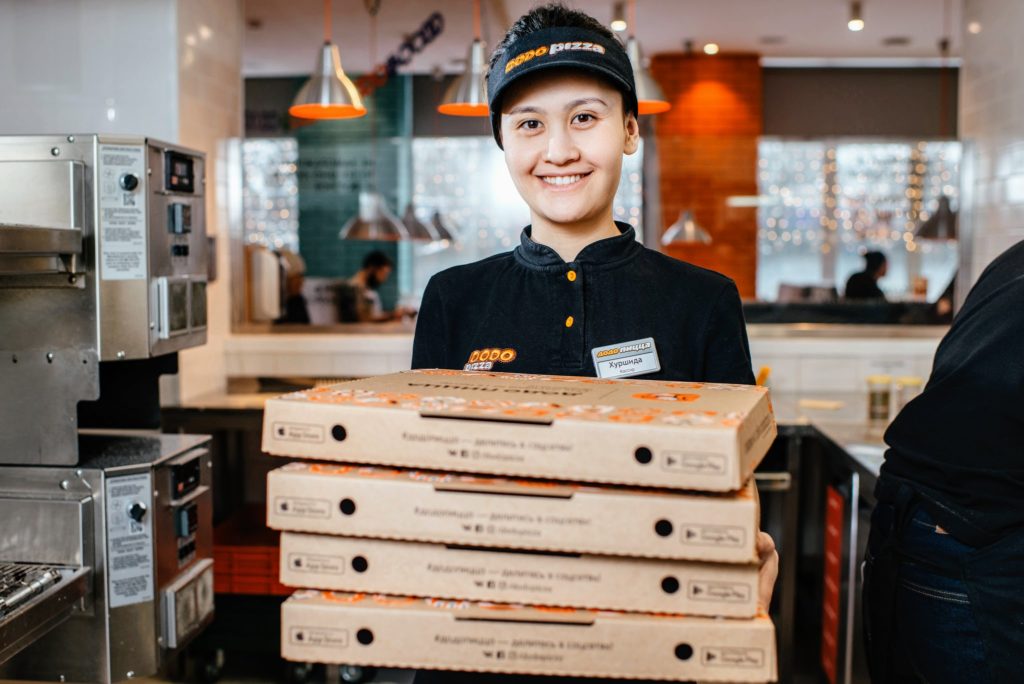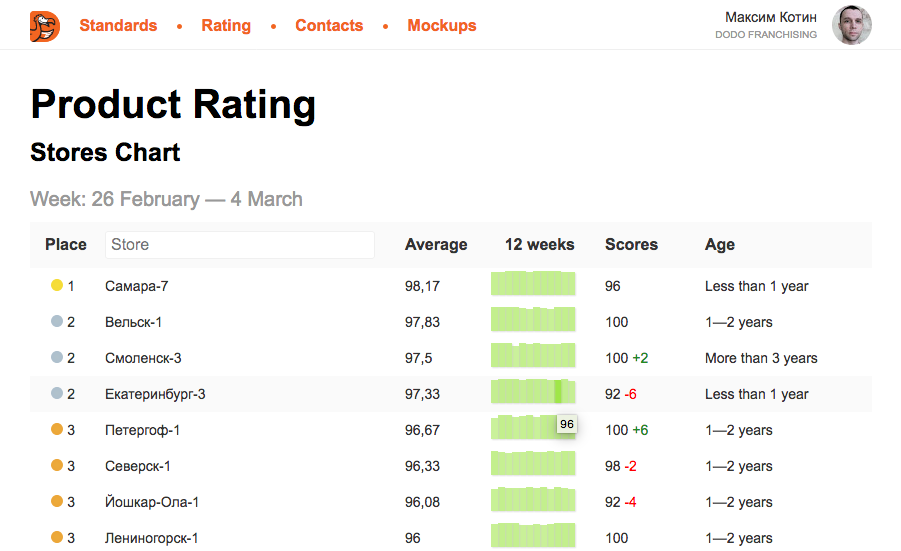
3,100 inspections a month: how we go about quality control at Dodo Pizza
09 March 2018
A guest in Astrakhan found a piece of a finger nail in his pizza.
In Smolensk, a driver was drunk while making a delivery.
In Naberezhnye Chelny, a customer had to wait for his order for… eight hours.
I wish all that happened in places that didn’t provide their services under the name of Dodo Pizza. But they did. No point in hiding it.
Every person who tried to build a large-scale business knows that blunders are inevitable. When your organization performs thousands of operations a day, people sometimes mess up. Things happen.
The real problem appears when things happen, but you don’t have a freaking clue about it.
How you can know everything
We at Dodo have contrived to open more than 300 shops in less than seven years. Most of them are now scattered across a country that covers about one-eighth of the Earth’s inhabited land area.
Who knows what’s going on in every pizza shop of ours? That’s a kind of question any growing, large-scale business faces—how do you ensure the same quality in all the places of your business?
For the last seven years, our team has been looking for an answer.
Sending out reps—or doing it the smart way
In the beginning, we didn’t have much money and couldn’t afford to send out our reps to inspect our franchisees on a regular basis like other chains usually do.
On the other hand, we saw untapped potential in the rise of social media, modern ways of communication, and our policy of total transparency.
So we’ve put together an unorthodox system that now keeps us informed about what’s really happening in our pizzerias while we’re at our fancy Moscow office mulling over a new ad campaign that will extol our awesome brand.
An army of shoppers
The most important part of our system is based on weekly inspections performed by our mystery shoppers. Instead of employing inspectors, we recruit them from our customers on social media or via digital channels.
Here is the deal we offer: sign up for the program, do the inspection following our pretty straightforward guidelines, and get a free pizza as a reward.
Our mystery shoppers inspect every pizzeria in the chain twice a week. About 37,000 people are involved in our mystery shoppers program. Though our inspection team is limited to a dozen people, we manage to perform around 3,100 inspections a month.
How to turn a customer into a top-rate inspector
Our mystery shoppers are just our general customers, but in inspections, we can’t rely on their individual opinions. So we’ve written guidelines that make the process easy to follow and the results reliable.
After getting an order, a mystery shopper has to fill in our checklist (as you know, we love checklists). There are dozens of questions that cover every aspect of our business. Was the bathroom clean? How fast was the delivery? Did the delivery driver greet the customer by name?

Mystery shoppers also take photos of their pizzas and send them to our office for our managers to assess the quality of the product. Our team can make a pretty accurate assessment of a pizza quality based just on its photos.
Making our inspections transparent
Transparency is one of the most critical parts of our inspections. Every week, we share the results with our partners so they can study their mistakes.

Also every week, each pizzeria gets a ranking depending on how many imperfections have been discovered by its mystery shopper.
The perfect product gets 100 points. Having 90 to 99 is still good enough, while 80 to 90 would give a partner much to think about. If you get less than 75, you're in real trouble.
The ranking is public—we share it not only with all our partners but also with all our customers who care to check it online.
The difference a public ranking makes
On Mondays, our internal website attracts three times more traffic than usual. At this time, we update our Quality Ranking and many members of our team go online to check their results.
The ranking is an essential motivation element for all of our partners. Their teams eye it closely. Since you see all the results in one spreadsheet, it turns the ranking into a never-ending championship in quality and service.
There is also a practical reason to care about your results. As a franchisee, you can’t open new pizza shops if your ranking isn’t good enough. And those who let their average number fall below 75 over twelve weeks lose the right to represent the Dodo brand if they don’t turn things around.
Since our mystery shoppers’ reports are open to our partners, they trust the results and can always be sure that we don’t alter them in favor of any corporate politics.
Need a change? Change the checklist
The first version of our Ranking was introduced in 2013. We’ve been improving our methodology since then, building infrastructure for managing our mystery shoppers and tweaking our checklist.
Everything we deem important for our service, we just add to the list, making our partners pay attention. The more points franchisees can lose for some mistake, the more reason will be for them to focus on the area in question.
We believe that now our ranking has grown into one of the most developed and innovative systems of its kind. It's still a work in progress, though. We see its limitations and add other complimenting processes serving the same purpose to it.
Cracking down on bad product
There is the Standards Ranking which is based on the same principles, but covers kitchen cleanliness and order.
Every week, our team also checks up on mentions of Dodo Pizza and records every negative comment found on social media. Their quantity and the way in which they are handled by partners also impacts their Quality Ranking.
Finally, at the end of last year, we crowned these practices with a more traditional procedure and started sending our reps to check up on the franchisees. These inspections happen from time to time, but they help us spot some things that fall through the cracks of our regular system.
What our partners think about all that
There is a pattern. The least successful partners see these moves as some kind of punishment. They try hard to avoid being caught.
The others don't focus on not being caught—they focus on not screwing up in the first place. The best partners see the Ranking and all our other practices as a service we provide our franchisees in order to help them make more money.
If they do a sloppy job, better we warn them now before the market punishes them later—with a striking blow.
